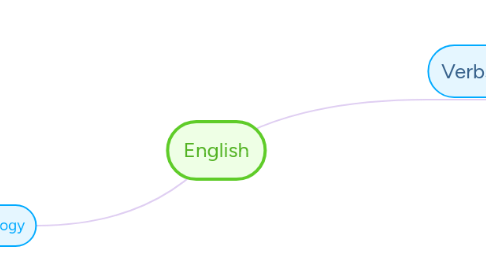
1. Verbs
1.1. Present
1.1.1. Present Simple
1.1.1.1. Affirmative: Subject + Infinitive without to (In the 3rd person singular we add -s or -es)
1.1.1.2. Negative: Subject + don't/doesn't + main verb
1.1.1.3. Interrogative: Do/Does+subject+main verb
1.1.1.4. Permanent situations
1.1.1.4.1. Eg. She works in a bank.
1.1.1.5. Generally true
1.1.1.5.1. Eg. The sun rises in the east.
1.1.1.6. Habits
1.1.1.6.1. Eg. I play tennis every Tuesday.
1.1.1.7. Future Timetables
1.1.1.7.1. Eg. Our train leaves at 11 am.
1.1.2. Present Continuous
1.1.2.1. Affirmative: Subject + verb to be (am/is/are) + main verb + -ing
1.1.2.2. Negative: Subject + verb to be + not (am not/isn't/aren't) + main verb + -ing
1.1.2.3. Interrogative: Verb to be (Am/Is/Are) + subject + main verb + -ing
1.1.2.4. Something happening at the moment
1.1.2.4.1. Eg. I'm reading a book about Vampires.
1.1.2.5. Actions happening in the near future
1.1.2.5.1. Eg. I'm going to write you a postcard.
1.1.3. Present Perfect
1.1.3.1. Affirmative: subject + have/ has + past participle to the main verb
1.1.3.2. Negative: subject + have/ has + not + past participle
1.1.3.3. Interrogative: Have/ Had + subject + past participle of the main verb
1.1.3.4. Things started in the past and it is still true in the present
1.1.3.4.1. Eg. I have visited three European countries up to now.
1.2. Past
1.2.1. Past Simple
1.2.1.1. Affirmative: *Regular verbs: Subjects + verb + -ed *Irregular verbs: Subject + irregular form
1.2.1.2. Negative: Subject + did + not + main verb
1.2.1.3. Interrogative: Did + subject + main verb
1.2.1.4. Something that happened in the past and is finished now
1.2.1.4.1. Eg. I did a group work yesterday.
1.2.1.5. Sequence of events in the past
1.2.1.5.1. Eg. First she read the book and then she plays games in the computer.
1.2.2. Past Continuous
1.2.2.1. Affirmative: subject + past simple of the verb to be (was/were) + main verb + -ing
1.2.2.2. Negative: Subject + past simple of the verb to be + not ( wasn't/weren't) + main verb+ -ing
1.2.2.3. Interrogative: past simple of the verb to be ( Was/Were) + subject + main verb + -ing
1.2.2.4. Describe an action that was in progress in the past
1.2.2.4.1. Eg. I was playing football.
1.2.2.5. Action interrupted by another action in the past
1.2.2.5.1. Eg. I was watching TV when the landline phone rang.
1.3. Future
1.3.1. Future Simple
1.3.1.1. Affirmative: Subject + will + infinitive without to
1.3.1.2. Negative: subject + will + not (won't) + infinitive without to
1.3.1.3. Interrogative: Will + subject + infinitive without to
1.3.1.4. Predictions
1.3.1.4.1. Eg. I will get a good mark at Maths.
1.3.1.5. Promises
1.3.1.5.1. Eg. I promise that I will text you back.
1.3.1.6. Facts
1.3.1.6.1. Eg. The Internet will be in every home.
1.4. Condicional
2. Technology
2.1. Aspects
2.1.1. Pros
2.1.1.1. It keeps us company;
2.1.1.2. It's a source of entertainment/relaxation;
2.1.1.3. It is educational;
2.1.1.4. You have a wide variety of resources;
2.1.1.5. Ou can use it to be in contact with other people (means of communication);
2.1.1.6. It makes human life easier.
2.1.2. Cons
2.1.2.1. It can isolate people and destroy our social skills;
2.1.2.2. It can become addictive;
2.1.2.3. You neglect other activities/hobbies;
2.1.2.4. It is a source of distraction;
2.1.2.5. You become more passive;
2.1.2.6. Your personal information/money can be stolen (piracy).
2.2. Vocabulary
2.2.1. iPod
2.2.2. Laptop
2.2.3. Mobile Phone
2.2.4. Video conference
2.2.5. Chatroom
2.2.6. Landline phone
2.2.7. Text messaging
2.2.8. Fax
2.2.9. Email
2.2.10. Web cam
2.2.11. Television
